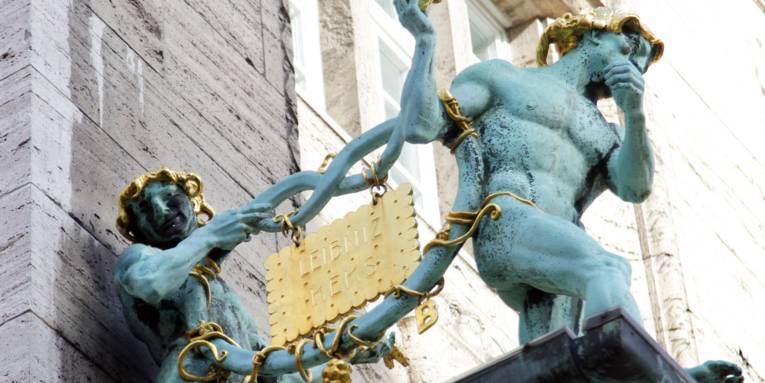Not only did Hermann Bahlsen (1859-1919) invent the butter biscuit with 52 "sprockets", the German word "Keks" is also on his behalf. In 1880, Hermann Bahlsen worked as a sugar merchant in London and got to know the slightly sweet cookies that the English preferred eating together with their tea and called "cakes".
Back in Hannover, he founded a company called "Hannoverian Cakes Factory H. Bahlsen" in 1889. Two years later his "butter cakes" came into the market for the first time. They were sold in little bags and honoured with the gold medal in 1893 at the world exhibition in Chicago.
It was important to Hermann Bahlsen that his cookies with buttery taste had a "personality" and so, taking also advertising into account, he named them "Leibniz Cakes" and thereby honoured the Hannoverian philosopher Gottfried Wilhelm Leibniz (1646-1716). Since the costumers didn't pronounce the word "cakes" the English way, Bahlsen Germanised the term in 1911 and called his product "Keks" instead. The term was even included into the Duden a short time after that: The word "Keks" could be found in the spelling dictionary of the German language for the first time in 1915 with the meaning "dry, durable cooky".
For 100 years, a giant golden Leibniz Cake hung inbetween two pretzel men on the front of the Bahlsen head office in Hannover. Until January 2013, when the nearly 20 kilogramme heavy and half a metre long company emblem made out of gilded bronze was stolen by some joker from its place five metres high. A couple of days later unknown blackmailers, who called themselves "cookie monsters", claimed cookies for free for a children's hospital and a donation for an animal shelter in order to return the cake. If the claims aren't fulfilled, they said, the giant golden cake would land in Oscar's dustbin (also a famous character from the children's TV programme "Sesame Street").
The news of this unusual theft went all around the world. About two weeks later, on 5 February 2013, the golden cake reappeared at the memorial of the Leibniz university in Hannover, decorated with a red ribbon. On 11 July 2013, the emblem returned to its usual spot and now looks shinier than ever before - and is under surveillance by a video camera.
It is widely known that the great philosopher Gottfried Wilhelm Leibniz demanded "clarity in words, usefulness in things" (which definitely applies to Bahlsen's Leibniz Cakes) and recommended that soldiers should be fed with durable "zwieback" instead of bread in his essay "Requirements of Warfare" in 1683. However, it was not passed on so far that the polymath had a weakness for butter biscuits. It was just common in Bahlsen's days to name food after famous personalities: Nowadays we enjoy Bismarck Herrings, Mozart Balls, Schiller Locks or Leibniz Cakes.
Why does a Leibniz Cake consist of exactly 52 "sprockets"? "The cookie would taste differently with 50", revealed the grandson of the company founder and nowadays CEO Werner Michael Bahlsen in an interview with the German "Focus" magazine on 11 April 2014 on the occasion of his 65th birthday.
 Deutsch
Deutsch
 English
English
 中文
中文
 Danish
Danish
 Eesti
Eesti
 Español
Español
 Suomi
Suomi
 Français
Français
 Italiano
Italiano
 日本語
日本語
 한국
한국
 Nederlands
Nederlands
 Norge
Norge
 Polski
Polski
 Portugues
Portugues
 Русский
Русский
 Svenska
Svenska
 Türkçe
Türkçe
 العربية
العربية
 Romanesc
Romanesc
 български
български
 © hannover.de
© hannover.de